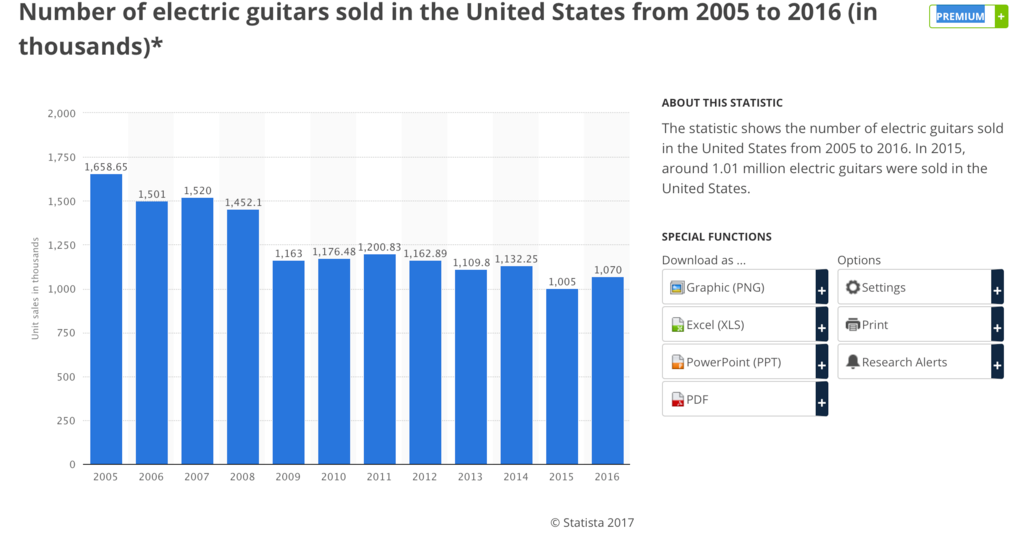shinksma
What? I get a title?
- Joined
- Mar 20, 2014
- Messages
- 5,310
Saw this just now via a FB post, decided to ask here about at least one statement made in it. The article:
https://www.washingtonpost.com/grap...f-the-electric-guitar/?utm_term=.cf1561d4cc09
The statement that bugs me, guess which part:
I find this hard to believe, based on what we have seen about US capacity (RL Vela and CE production now spreading out several more months).
Most of this article is "inflammatory", as much of the "mainstream media" is characterized as in other areas of so-called "news". I don't think the electric guitar is any closer to dying now than it was in 1983 (xref New Wave and synthesizers, etc). Will companies that have lousy product and/or are poorly run go out of business or have to restructure? Possibly - but that is not equivalent to the "death of the electric guitar".
It also describes how there are so many more good guitar manufacturers out there:
OK, so this just means there is more choice, and the crappy manufacturers will probably suffer: new ones that don't have a good product will wither before they get anywhere, and big ones with declining quality will cede market share to other companies with better product. So? Isn't that normal free-market capitalism?
Curiously, the article includes a couple of videos with Vernon Reid that feature PRS guitars prominently. And a good lead-up and quote from PRSh:
The article seems to be fear-mongering more than anything, and makes me disappointed they would choose to spin the topic in such a way.
Oh well, thought I would vent. Sorry. Anyway: anyone have any basis to back up or refute the claim that PRS "cut staff"?
https://www.washingtonpost.com/grap...f-the-electric-guitar/?utm_term=.cf1561d4cc09
The statement that bugs me, guess which part:
The two biggest companies, Gibson and Fender, are in debt, and a third, PRS Guitars, had to cut staff and expand production of cheaper guitars.
I find this hard to believe, based on what we have seen about US capacity (RL Vela and CE production now spreading out several more months).
Most of this article is "inflammatory", as much of the "mainstream media" is characterized as in other areas of so-called "news". I don't think the electric guitar is any closer to dying now than it was in 1983 (xref New Wave and synthesizers, etc). Will companies that have lousy product and/or are poorly run go out of business or have to restructure? Possibly - but that is not equivalent to the "death of the electric guitar".
It also describes how there are so many more good guitar manufacturers out there:
“There are more makers now than ever before in the history of the instrument, but the market is not growing,”
OK, so this just means there is more choice, and the crappy manufacturers will probably suffer: new ones that don't have a good product will wither before they get anywhere, and big ones with declining quality will cede market share to other companies with better product. So? Isn't that normal free-market capitalism?
Curiously, the article includes a couple of videos with Vernon Reid that feature PRS guitars prominently. And a good lead-up and quote from PRSh:
Paul Reed Smith, the Maryland-based guitar designer, says the industry is just now recovering from the recession that struck in 2009. He points to PRS’s sustained revenue — the company says they’re between $42 million and $45 million a year — and an increased demand for guitars.
“This is a very complicated mix of economy versus market, demand versus what products are they putting out, versus are their products as good as they used to be, versus what’s going on with the Internet, versus how are the big-box stores dealing with what’s going on,” Smith says. “But I’ll tell you this: You put a magic guitar in a case and ship it to a dealer, it will sell.”
The article seems to be fear-mongering more than anything, and makes me disappointed they would choose to spin the topic in such a way.
Oh well, thought I would vent. Sorry. Anyway: anyone have any basis to back up or refute the claim that PRS "cut staff"?


